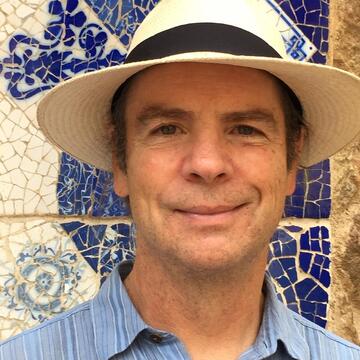
Jim Williams
Professor
Biography
Dr. Jim Williams is a global thought leader in the area of low-carbon energy systems. At USF his focus is on developing a new generation of energy professionals with the skills and knowledge needed to have rewarding careers in sustainably meeting society’s energy needs.
Dr. Williams has written extensively about the transition from today’s energy system to one that emits no climate-altering greenhouse gases (“net zero”) and is involved in many research collaborations. He is a senior research fellow with Evolved Energy Research and director of the Deep Decarbonization Pathways Project (DDPP) for the Sustainable Development Solutions Network.
Dr. Williams was formerly chief scientist at Energy and Environmental Economics (E3), where he led analysis of decarbonization strategies for California’s government agencies, helping to shape the state’s climate and energy policies. He also directed the DDPP’s consortium of research teams from the 16 highest-emitting countries, whose work strongly influenced the Paris Agreement.
He has consulted on many aspects of energy technology, planning, and regulation for government, utility, and industry clients. His experience ranges from renewable energy to electric vehicles, retail rate-making to wholesale markets, environmental siting to the water-energy nexus.
Dr. Williams formerly taught at the Monterey Institute of International Studies, where his research interests included the technical and institutional challenges of decarbonizing China’s power sector.
Expertise
- Energy technology, planning, and regulation
- Low carbon energy systems
- Climate change science and policy
Education
- PhD in Energy and Resources, University of California, Berkeley
- MS in Energy and Resources, University of California, Berkeley
- BS in Physics, Washington & Lee University
Prior Experience
- Senior Research Fellow, Evolved Energy Research
- Director, Deep Decarbonization Pathways Project
- Chief Scientist, Energy & Environmental Economics (E3)
- Associate Professor, Monterey Institute of International Studies
- Senior Associate, Nautilus Institute for Security and Sustainability
- Engineer, National Semiconductor Corporation
- Engineer, Schlumberger Well Services
Selected Publications
-
Williams, J.H., R. Jones, M.S. Torn (2021). Observations on the transition to a net-zero energy system in the United States. Energy and Climate Change, 2, 100050.
-
Williams, J.H., R. Jones, B. Haley, G. Kwok, J. Hargreaves, J. Farbes, M.S. Torn (2021). Carbon-neutral pathways for the United States. AGU Advances, 2(1) e2020AV000284.
-
Waisman, H., et al. (2019). A pathway design framework for national low greenhouse gas emission development strategies. Nature Climate Change, 9, 261–268.
-
Iyer, G., Ledna, C., Clarke, L., Edmonds, J., McJeon, H., Kyle, P., & Williams, J.H. (2017). Measuring progress from nationally determined contributions to mid-century strategies. Nature Climate Change, 7(12), 871.
-
Sachs, J.D., Schmidt-Traub, G., & Williams, J. (2016). Pathways to zero emissions. Nature Geoscience, 9, 799-801.
-
Yeh, S., Yang, C., Gibbs, M., Roland-Holst, D., Greenblatt, J., Mahone, A., Wei, D., Brinkman, G., Cunningham, J., Eggert, A., Haley, B., Hart, E., & Williams, J. (2016). A modeling comparison of deep greenhouse gas emissions reduction scenarios by 2030 in California. Energy Strategy Reviews, 13:14, 169-180.
-
Bataille, C., Waisman, H., Colombier, M., Segafredo, L., Williams, J., & Jotzo, F. (2016). The need for national deep decarbonization pathways for effective climate policy. Climate Policy, 16:1, 1-20.
-
Bataille, C., H. Waisman, M. Colombier, L. Segafredo, J.H. Williams (2016). The Deep Decarbonization Pathways Project (DDPP): insights and emerging issues. Climate Policy, 16:1, S1-S6.
-
Morrison, G.M., Yeh, S., Eggert, A.R., Yang, C., Nelson, J.H., Greenblatt, J.B., Isaac, R., Jacobson, M.Z., Johnston, J., Kammen, D.M., Mileva, A., Moore, J., Roland-Holst, D., Wei, M., Weyant, J.P., Williams, J.H., Williams, R., & Zapata, C.B. (2015). Comparison of low-carbon pathways for California. Climactic Change, 131(4), 545-557.
-
Wu, G.C., M.S. Torn, and J.H. Williams (2015). Incorporating land-use requirements and environmental constraints in low-carbon electricity planning for California. Environmental Science & Technology, 49 (4), 2013-2021.
-
McKenzie, L., Orans, R., Williams, J.H., & Mahone, A. (2014). Strengthening the Clean Power Plan: Three Key Opportunities for the EPA. The Electricity Journal, 27(10).
-
Cutter, E., Haley, B., Williams, J., & Woo, C.K. (2014). Cost-Effective Water-Energy Nexus: A California Case Study. The Electricity Journal, 27(6), 61-68.
-
Cutter, E., Haley, B., Hargreaves, J., & Williams, J. (2014). Utility scale energy storage and the need for flexible capacity metrics. Applied Energy, 124, 274-282.
-
Hu, J., Kwok, G., Xuan, W., Williams, J.H., & Kahrl, F. (2013). Using natural gas generation to improve power system efficiency in China. Energy Policy, 60, 116-121.
-
Kahrl, F., J. Hu, G. Kwok, J. H. Williams (2013). Strategies for expanding natural gas-fired electricity generation in China: economics and policy. Energy Strategy Review, 1, 1-8.
-
Kahrl, F., J.H. Williams, J. Hu (2013). The political economy of electricity dispatch reform in China. Energy Policy, 53, 361-369.
-
Haley, B., J.B. Gallo, A. Kehr, M. Perry, D. Siao, W. Smallen, M.S. Torn, J.H. Williams (2012). The 2020 emissions reduction impact of urban water conservation in California. Journal of Water and Climate Change, 3, 151-162.
-
Williams, J.H., DeBenedictis, A., Ghanadan, R., Mahone, A., Moore, J., Morrow III, W.R., Price, S., & Torn, M.S. (2012). The Technology Path to Deep Greenhouse Gas Emissions Cuts by 2050: The Pivotal Role of Electricity. Science, 335(6064), 53-59.
-
Kahrl, F., Williams, J., Jianhua, D., & Junfeng, H. (2011). Challenges to China's transition to a low carbon electricity system. Energy Policy, 39(7), 4032-4041.
-
Von Hippel, D., T. Suzuki, J.H.Williams, T. Savage, and P. Hayes (2011). Energy security and sustainability in Northeast Asia. Energy Policy, 39, 6719-6730.
Courses
- ENGY 610: Quantitative Methods for Energy and Environment
- ENGY 612: Energy Technologies, Resources, and Systems
- ENGY 630: Electric Power Systems
- ENGY 644: Energy Modeling
- ENGY 690: Group Masters Project in Integrated Resource Planning